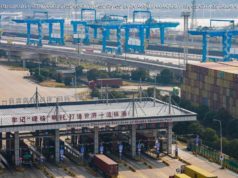What can the Chinese actually do about the threat from Kim Jong Un?
The Trump administration claims “all options are on the table” for dealing with North Korea’s nuclear-weapons program—from using military force, to pressuring China to punish its North Korean ally, to Donald Trump negotiating directly with Kim Jong Un. But what do those options look like? And what consequences could they have? This series explores those questions, option by option.
The leaders of North Korea’s greatest adversary and greatest ally agree: It’s bad that North Korea has nuclear weapons, and it would be better if they gave them up. So why do the United States and China keep butting heads over North Korea, as Kim Jong Un fine-tunes his nuclear arsenal?
The latest effort to counter North Korea’s nuclear program— UN Security Council sanctions on several North Korean exports, orchestrated by American and Chinese negotiators—appears to indicate that the United States and China are finally joining forces to crush Kim’s nuclear ambitions. Yet the unity of purpose fades upon closer inspection. U. S. officials have questioned whether the Chinese government will enforce the sanctions, as the Trump administration considers ways to retaliate if Beijing fails to get tougher on its ally in Pyongyang. Donald Trump has boasted that the Security Council sanctions will have a “very big financial impact” on the North Korean economy, but the Chinese likely prevented the impact from being even bigger; the UN measures, for instance, notably do not restrict China and other countries from exporting oil to North Korea.
And mere days after the sanctions passed, Trump showed why UN cooperation may be less than meets the eye, threatening to unleash “fire and fury” against the North if its leaders continued to threaten the U. S.
“China could easily solve this problem!” Trump has tweeted in the past. How? The United States could take at least three paths to partner with China on addressing the North Korean nuclear threat. Each path is beset with obstacles.
Play by China’s Rules
China has, in fact, proposed a plan for solving the North Korea problem. As part of an approach that it calls “ suspension for suspension, ” the Chinese government has offered to broker a deal in which North Korea suspends its rapidly advancing nuclear and missile programs in exchange for the United States suspending its regular military exercises with South Korea, as a prelude to negotiations to eventually rid the North of nuclear weapons.
North Korea: The Military Options
But the Trump administration has repeatedly rejected the suggestion. Indeed, it strikes at the heart of how the Chinese government views the North Korean challenge differently than the U. S. government does.
Whereas U. S. officials want North Korea to renounce nuclear weapons—or at least take steps toward “ denuclearization ”—as a precondition for talks, Chinese officials consider denuclearization an end goal of negotiations, not a starting point. Whereas U. S. officials see North Korean militancy as the sole threat to security on the Korean peninsula, Chinese officials perceive North Korean and American provocations as twin threats—“two accelerating trains coming toward each other” and refusing “to give way, ” in the words of China’s foreign minister, Wang Yi. Whereas U. S. officials identify China as the central actor in the peninsular drama, holding the fate of North Korea in its hands, Chinese officials place their country just off-stage, merely directing feuding parties toward peace. While U. S. officials experiment with ways to exert pressure on North Korea, Chinese officials seek out pressure-relief valves. U. S. officials worry that nuclear negotiations with North Korea, which have backfired in the past, are a trap; Chinese officials claim dialogue is the only way out of the crisis. (Chinese embassy officials declined to comment on the record for this story.)
“The most urgent task at hand is to halt [North Korea’s] nuclear and missile programs, ” Wang, the Chinese foreign minister, argued in a speech to the UN Security Council in April. “To achieve this, it is worthwhile to put aside the contention over who should take the first step and who is right, who is wrong. Rather, we should start from reaching for low-hanging fruits, defuse any flashpoint endangering peace on the peninsula, and create conditions for stability in the region.”
Wang’s counterpart, U. S. Secretary of State Rex Tillerson, disagrees. “If we freeze where [the North Koreans] are today, we freeze their activities with a very high level of capability, ” he explained in July, alluding to the fact that North Korea is close to having —or may already have —the means to hit the United States with a nuclear-tipped intercontinental ballistic missile. “We’ re asking North Korea to be prepared to come to the table with an understanding that these talks are going to be about how do we help you chart a course to cease and roll back your nuclear program. That’s what we want to talk about. … Because stopping where they are today is not acceptable to us.”
Somewhere in between these positions may be a diplomatic solution to the current impasse. But if so, the parties haven’ t found it yet.
Pressure China
China shares an 880-mile border with North Korea. It has a 56-year-old defense treaty with the North Koreans. It accounts for over 90 percent of North Korea’s trade. No country has more influence on North Korea than China. But the question the Trump administration is currently probing is what the limits of that influence are—and how China can be pushed to those limits.
The primary way that China can change Kim Jong Un’s calculus on nuclear weapons, according to the Trump administration, is by fully enforcing existing UN Security Council sanctions and restricting trade with North Korea well beyond what’s included in those sanctions. To persuade Chinese leaders to do this, U. S. officials have alternated between carrots and sticks. Trump has praised Chinese President Xi Jinping and offered him a favorable trade deal in exchange for help on North Korea, but the president and his advisers have also threatened to go to war on the Korean peninsula—a terrifying prospect for the Chinese—if China doesn’ t rein in North Korea’s nuclear program. (Trump’s recent fire-and-fury warning may have been intended as much for Beijing as Pyongyang.)
The main form of pressure under discussion is economic. Trump’s Treasury Department recently imposed sanctions on a Chinese bank for allegedly laundering money for North Korea, and the administration is mulling further “ secondary sanctions ” on Chinese companies that do business with the North Korean government. It has also floated a range of punitive trade policies, from a tariff on steel imports to retaliation against Chinese intellectual-property violations. U. S. officials have long avoided such actions out of concern that punishing China would make it less cooperative, not more, on North Korea. But Anthony Ruggiero, a sanctions expert and former Treasury Department official, argues that this analysis misses the way that targeted financial measures work. Beyond drying up funding for North Korea’s nuclear-weapons program, he has written, economic penalties could, for instance, “drive a wedge between Chinese banks that covet their access to the U. S. financial system and Chinese leaders who indulge North Korea. If the banks fear they will be the next target of U. S. sanctions, they will pressure political leaders to change course.” (There’s recent precedent for this: The U. S. sanctions campaign to contain the Iranian nuclear program coerced China into reducing its trade and financial ties with Iran.)
Nevertheless, perhaps encouraged by China’s assistance at the United Nations and discouraged by the thought of sparking a trade war between the world’s largest economies, the Trump administration has proven reluctant to embrace this approach. Additional secondary sanctions, steel tariffs, and an investigation into China’s intellectual-property policies are all on hold at the moment.
Even if Trump were to go all in on pressuring China, it’s far from clear that doing so would achieve the desired result: the dismantling of North Korea’s nuclear-weapons program. That’s in part because of an additional disconnect in how China and America assess and rank the threats posed by North Korea. As Jennifer Lind of Dartmouth College has pointed out, North Korea is presently a national-security priority for U. S. officials because Kim Jong Un is building missiles that could carry a nuclear device to the United States, but Chinese officials don’ t share that sense of urgency. North Korea has possessed nuclear weapons and shorter-range missiles that can hit China for years now.






